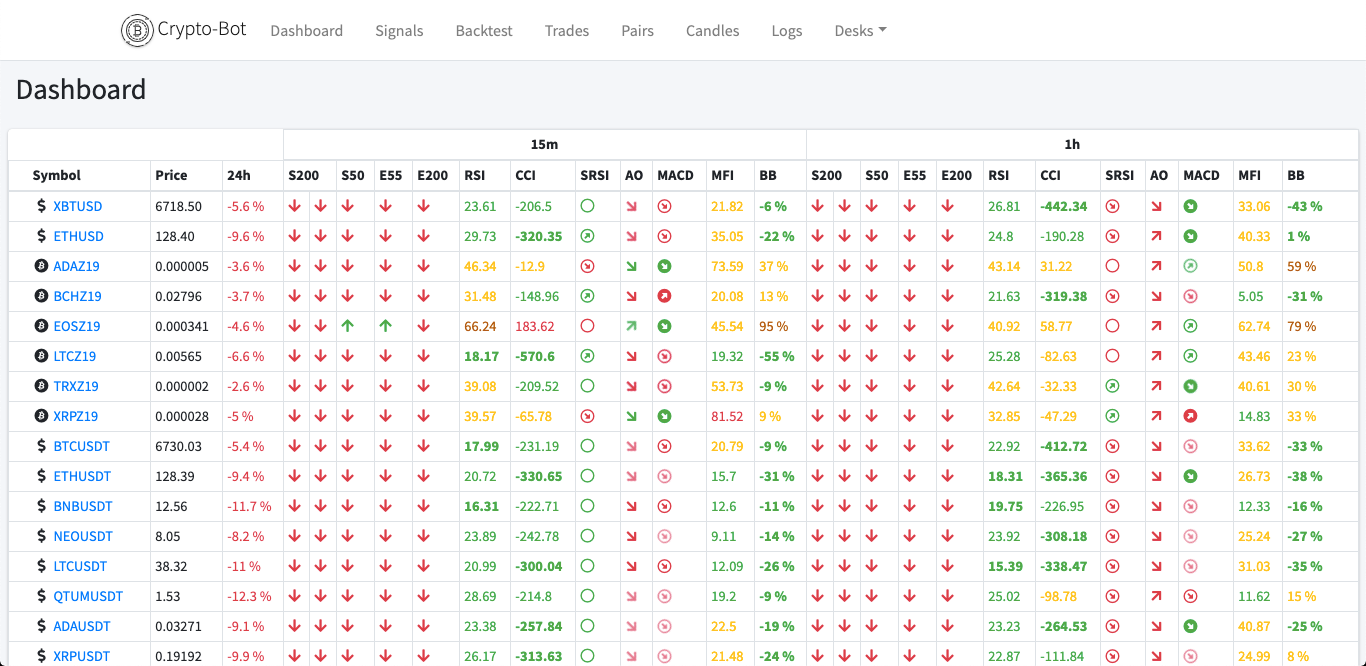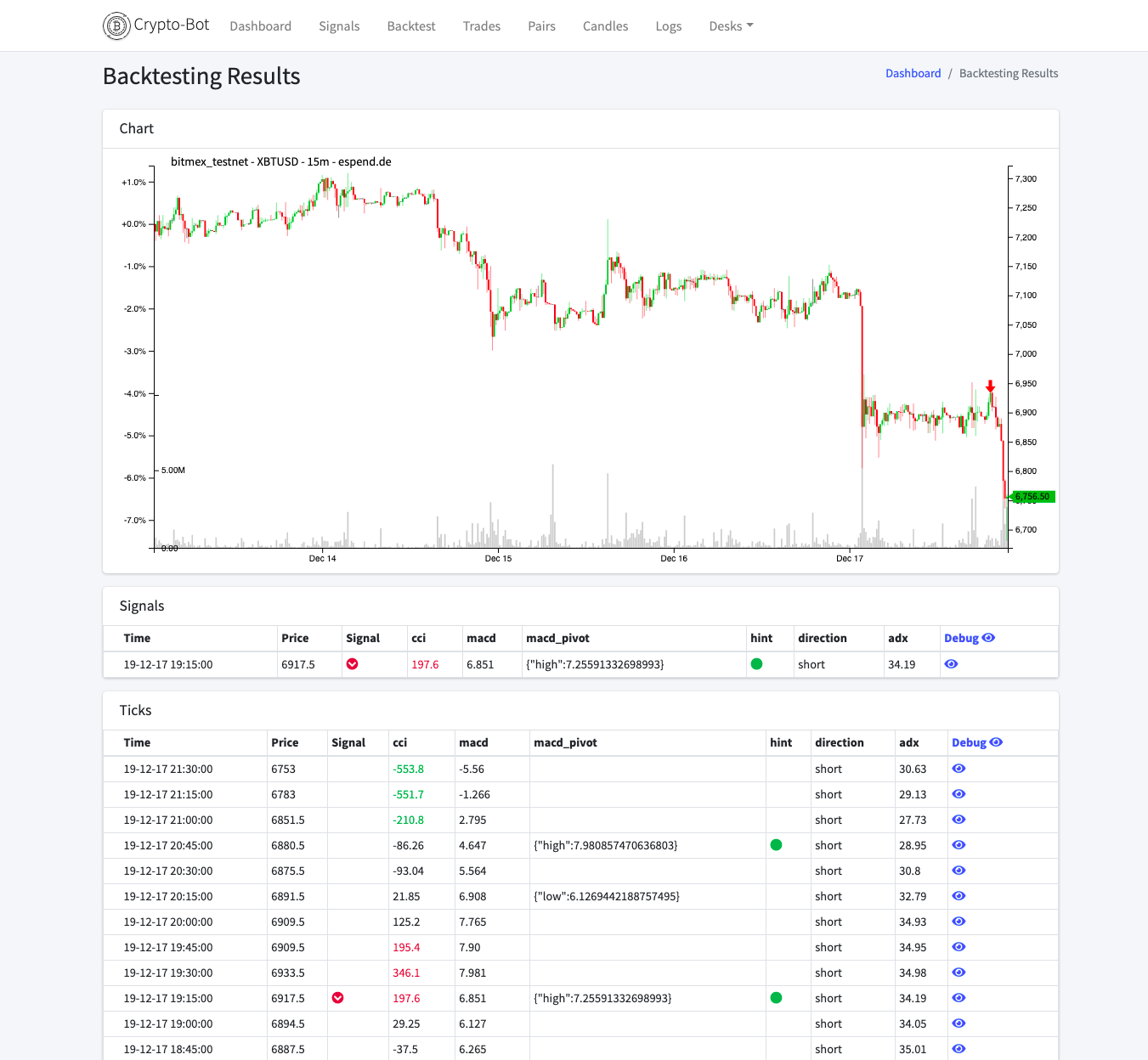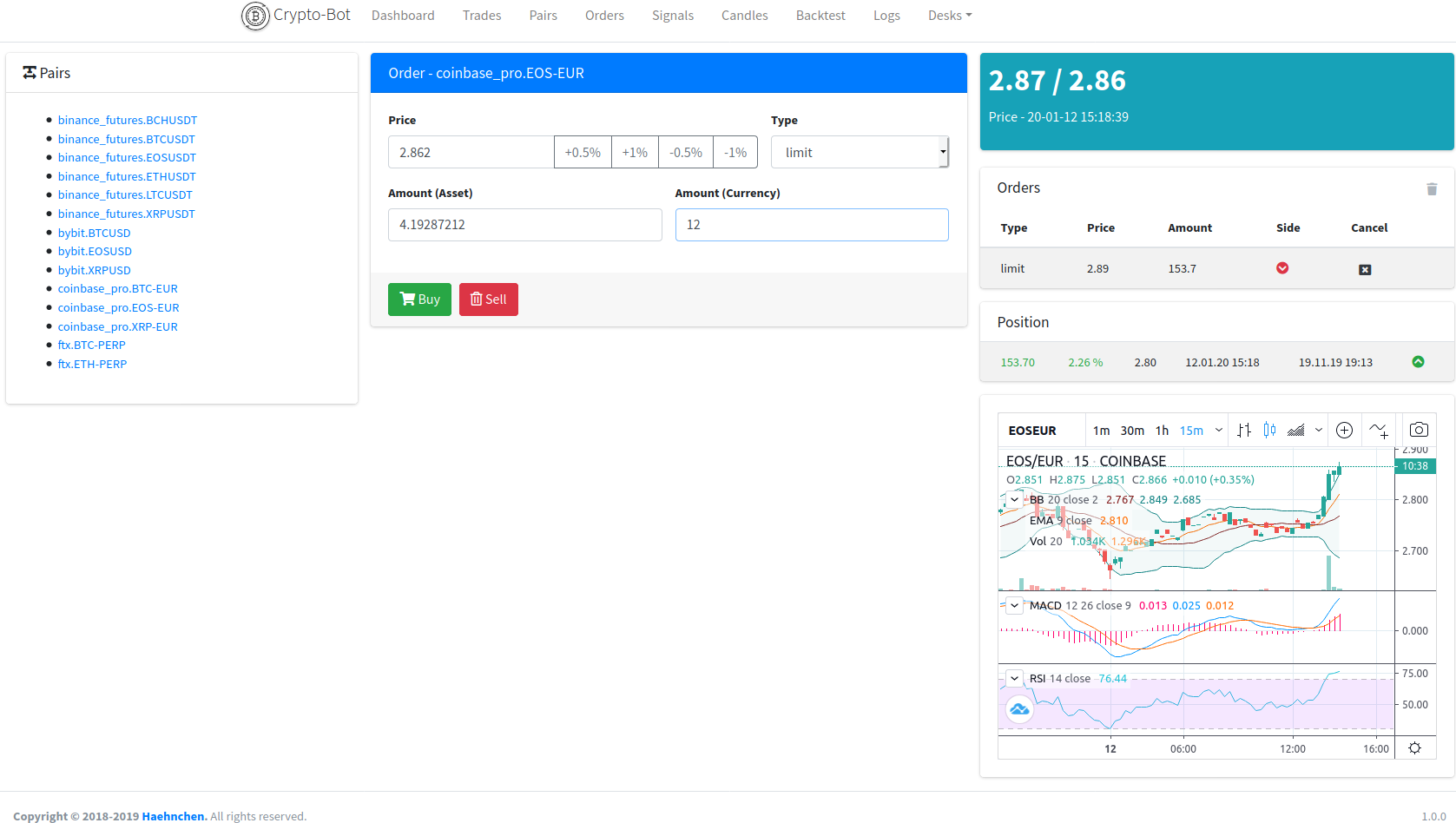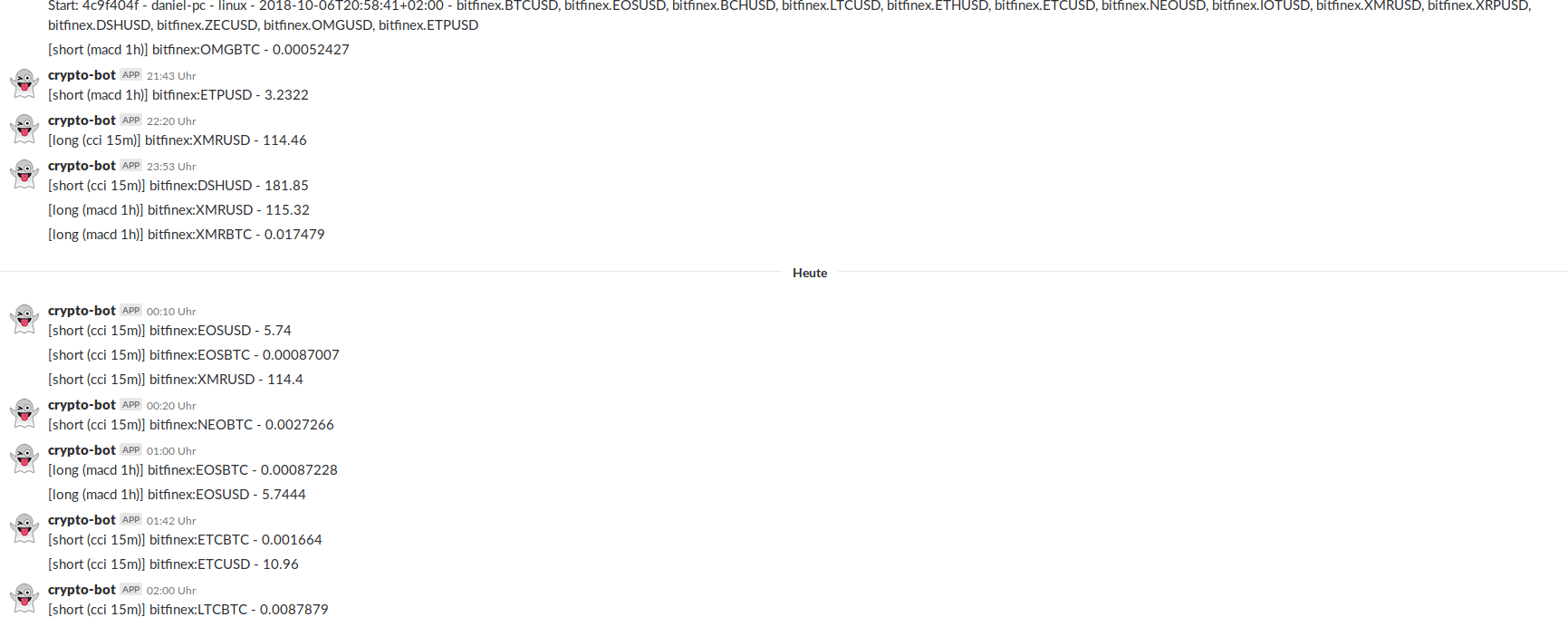A work in progress Cryptocurrency for common exchanges like Bitfinex, Bitmex and Binance. As most trading bots just provide basic buy and sell signals they provide many stuff to get profitable eg exchange orders like stop-losses or stop-limits are not supported by main bots. Also the limitation of fixed timeframe and technical indicators must be broken
Not production ready only basic functionality
- Added exchange latency measurements with websocket pingpong requests
- Added Binance Futures Testnet exchange
- Added Bybit Testnet exchange
- Added new events, every strategy can listen to: onPriceTicker(tickerEvent) and onOrderbook(obSnapshot, options)
- Fully use Websocket for exchange communication to react as fast as possible on market
- Multi pair support in one instance
- sqlite3 storage for candles, tickers, ...
- Webserver UI
- Support for going "Short" and "Long"
- Signal browser dashboard for pairs
- Slack and email notification
- Join foreign exchange candles (eg. Trade on Bitmex with the faster moving Binance trades / candles)
- TODO: Show possible arbitrage trades
- Bitmex with leverage configuration
- Bitmex Testnet
- Binance
- Binance Futures
- Binance Futures Testnet
- Kraken Futures just price ticker atm
- Coinbase Pro
- Bitfinex (margin wallet)
- Bybit with leverage configuration (Limitation on stops via websocket order; only updated once per minute)
- Bybit Testnet
- FTX (Perpetual Futures only)
TODOS:
- Huobi Global (margin)
- node.js
- sqlite3
- technicalindicators
- tulipindicators - tulind
- TA-Lib
- twig
- express
- Bootstrap v4
- Tradingview widgets
curl -o- https://raw.githubusercontent.com/mark-sch/RedGekko/master/install_centos.sh | bash
cd RedGekko
node index.js trade
Tested on Amazon AWS, with new CentOS image installed. Only execute once, config files are created with default values.
The tulip library is used for indicators; which sometimes is having some issues on npm install because of code compiling:
Install build tools
sudo apt-get install build-essential
The nodejs wrapper for tulipindicators is called Tulip Node (tuind), check out installation instructions there.
Also the build from source is not supporting all nodejs version. It looks like versions <= 10 are working. You can use nodejs 12 if you compiled it once via older version.
➜ npm install --production
➜ npm run postinstall
Create instance file for pairs and changes
cp instance.js.dist instance.js
Provide a configuration with your exchange credentials
cp conf.json.dist conf.json
Create a new sqlite database use bot.sql scheme to create the tables
sqlite3 bot.db < bot.sql
Lets start it
node index.js trade
For initialize the configuration once
➜ cp instance.js.dist instance.js && cp conf.json.dist conf.json && sqlite3 bot.db < bot.sql
➜ docker-compose build
➜ docker-compose up -d
After this you can use docker-compose which will give you a running bot via http://127.0.0.1:8080
First, you'll need to create a bot for Telegram. Just talk to BotFather and follow simple steps until it gives you a token for it. You'll also need to create a Telegram group, the place where you and crypto-trading-bot will communicate. After creating it, add the bot as administrator (make sure to uncheck "All Members Are Admins").
Invite @RawDataBot to your group and get your group id in sended chat id field
Message
├ message_id: 338
├ from
┊ ├ id: *****
┊ ├ is_bot: false
┊ ├ first_name: 사이드
┊ ├ username: ******
┊ └ language_code: en
├ chat
┊ ├ id: -1001118554477
┊ ├ title: Test Group
┊ └ type: supergroup
├ date: 1544948900
└ text: A
Look for id: -1001118554477 is your chat id (with the negative sign).
Some browser links
- UI: http://127.0.0.1:8080
- Signals: http://127.0.0.1:8080/signals
- Tradingview: http://127.0.0.1:8080/tradingview/BTCUSD
- Backtesting: http://127.0.0.1:8080/backtest
- Order & Pair Management: http://127.0.0.1:8080/pairs
As the webserver provides just basic auth for access you should combine some with eh a https for public server. Here s simple proxy_pass for nginx.
# /etc/nginx/sites-available/YOURHOST
server {
server_name YOURHOST;
location / {
proxy_pass http://127.0.0.1:8080;
}
listen 443 ssl; # managed by Certbot
ssl_certificate /etc/letsencrypt/live/YOURHOST/fullchain.pem; # managed by Certbot
ssl_certificate_key /etc/letsencrypt/live/YOURHOST/privkey.pem; # managed by Certbot
include /etc/letsencrypt/options-ssl-nginx.conf; # managed by Certbot
ssl_dhparam /etc/letsencrypt/ssl-dhparams.pem; # managed by Certbot
}
You should also set the listen ip to a local one
# config.json
webserver.ip: 127.0.0.1
Currently there is a the UI for backtesting
node index.js backfill -e bitmex -p 1m -s XRPZ18
For custom strategies use var/strategies folder.
Find some example strategies inside modules/strategy/strategies
order_adjustKeep open orders in bid / ask of the orderbook in first position
stoplossprovide general stoploss order in percent of entry price (Exchange Order)risk_reward_ratioCreates Risk Reward order for take profit and stoploss (Exchange Order Limit+Stop)stoploss_watchClose open position if ticker price falls below the percent lose; use this for exchange that dont support stop_loss order liek Binance
'watchdogs': [
{
'name': 'stoploss',
'percent': 3,
},
{
'name': 'risk_reward_ratio',
'target_percent': 6,
'stop_percent': 3,
},
{
'name': 'stoploss_watch',
'stop': 1.2,
}
],
To allow the bot to trade you need to give some "playing capital". You can allow to by via asset or currency amount, see examples below. You should only provide one of them, first wins.
c.symbols.push({
'symbol': 'BTC-EUR',
'exchange': 'coinbase_pro',
'trade': {
'capital': 0.015, // this will buy 0.015 BTC
'currency_capital': 50, // this will use 50 EUR and buys the equal amount of BTC (example: BTC price 3000 use 50 EUR. will result in 0.016 BTC)
},
})
Per pair you can set used margin before orders are created; depending on exchange
c.symbols.push({
'symbol': 'BTCUSD',
'exchange': 'bitmex',
'extra': {
'bitmex_leverage': 5,
},
})
c.symbols.push({
'symbol': 'EOSUSD',
'exchange': 'bybit',
'extra': {
'bybit_leverage': 5,
},
})
npm test
Other bots with possible design pattern
- https://github.com/DeviaVir/zenbot
- https://github.com/magic8bot/magic8bot
- https://github.com/askmike/gekko
- https://github.com/freqtrade/freqtrade
- https://github.com/Ekliptor/WolfBot
- https://github.com/andresilvasantos/bitprophet
- https://github.com/kavehs87/PHPTradingBot
Some strategies based on technical indicators for collection some ideas
- https://github.com/freqtrade/freqtrade-strategies
- https://github.com/freqtrade/freqtrade-strategies/tree/master/user_data/strategies/berlinguyinca
- https://github.com/xFFFFF/Gekko-Strategies
- https://github.com/sthewissen/Mynt/tree/master/src/Mynt.Core/Strategies
- https://github.com/Ekliptor/WolfBot/tree/master/src/Strategies



